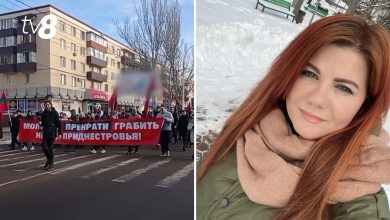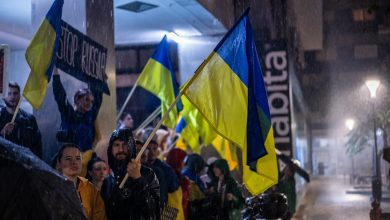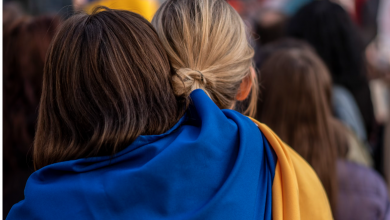Empathy and ethics matter when covering the stories of refugees from Ukraine

Irina Stryapko, journalist at TV8
BACKGROUND. My name is Irina Stryapko, I am a Ukrainian TV presenter and journalist. Since Russia’s full-scale invasion of Ukraine broke out, my life and the fates of millions of Ukrainians completely changed. I spent the most disastrous three months (as it seemed at that point) in my native country and was covering all the events; I did not even consider leaving the country, but after a while, the TV channel where I worked in Odessa was closed (since the beginning of the war, all the enterprises, TV channels, businesses, etc. were massively closing). When I received an offer to work in Moldova, I made a decision to stay here and to continue my mission: to inform people and to tell them about the war in Ukraine.
Since February 24, 2022, hundreds of thousands of Ukrainian citizens have crossed the border of Moldova to escape from Russian military aggression against Ukraine. Some of them have stayed in the territory of Moldova; according to the unofficial information, they are about one hundred thousand people. They are mainly teenagers, women with children, and elderly people. Many of them fled from the fire and lost their homes or relatives; many have fathers, sons, and brothers who keep defending Ukraine to this day. These people have different stories and destinies, but all of them have one thing in common: each of them was forced to leave their mother country because of the war.
It was when the idea of the author’s project titled «Доброго вечора, ми з України» (“Good Evening, We Are from Ukraine”) emerged, in partnership with the National Congress of Ukrainians of Moldova and the TV8 channel. This is where we share the stories of forcibly displaced people from Ukraine who stayed in Moldova, tell about their integration into society, the problems faced by Ukrainian and Moldovan citizens, and the way Moldova has been coping with the refugee crisis for more than a year and a half. While communicating with Ukrainian emigrants, with my fellow citizens, I emphasize several rules of my work for myself, and I will discuss them below.
***
According to the UN data, since the breakout of the war in Ukraine, approximately 14 million people left the country; almost half of them got back and those who decided to stay in the other countries have to deal with legalization issues, searching for jobs, and also recovering from their dramatic experiences. Therefore, when journalists write/film some materials about displaced persons, it is important not to make their moral state which is already quite difficult even worse. In this case, instead of looking for earth-shattering news, correspondents should tell the audience the refugees’ stories, covering the problems they face and the way they could be solved. Actually, they should get in touch with the experts and provide addresses of specialized institutions, hotline numbers, etc. There is no need to over-dramatize the material which is already hard enough to perceive. Basically, what you need is more facts, less emotions, and even less “water bewitched.”
There is one more important point to consider. Refugees are often forgotten about as soon as another crisis starts or when a fresh news story is in the center of attention. For instance, the war between Israel and Hamas is currently on everyone’s agenda. Undoubtedly, it has to be talked about as often as possible, because any war, terrorist attack, or refugee crisis has a detrimental impact on our entire civilization, but we should also keep in mind that the war in Ukraine is not over, the shelling has not ceased, and Ukrainians lose their lives every day. The problem with the present-day media is that the refugee crisis and the war are covered in waves, and the peak of interest is fleeting. We need to get back to people’s stories after a while, to show how their life has changed in the new country, how they have found new jobs and received their documents, and how they have felt during the adaptation period. We help other displaced persons by such materials when we provide some information.
As we tell the stories of those who have survived the war trauma, our main task is not to cause any harm. It is important to realize that, when we communicate with people in vulnerable situations, there are those who are eager to communicate and those who still hesitate. People can agree to take part in an interview at first, and after a while, they can refuse at any moment. In such cases, a journalist should not insist on continuing the conversation. Correspondents should mention that they respect their interlocutors’ decisions and act depending on the situation. It is important to remember that if people are reluctant to share the details of their life or completely retreat into themselves, THEIR RIGHT SHOULD BE RESPECTED. The media representatives should first of all have trusting relationships with their protagonists.
If a person agrees to talk to you, do not immediately turn the camera on; first, talk to them without technology and do not hurry. Do not think you need to film a story urgently, which is typical of working for TV. To get a good material, you need to really feel interested in the story. Avoid direct, “traumatizing” questions. If your interlocutors trust you, they will tell you everything themselves.
When working with refugees, you should keep in mind that all of them are different. They have their own characters and the way they perceive life, their own stories or situations, different religions, etc. Ukraine is a multinational and multicultural country; therefore, avoiding stereotypes is important.
Communicating with children is the most complicated task when you work with refugees. While talking to adults, journalists have to be as attentive and empathetic as possible; while working with children, they should be twice as careful. The first rule is that you cannot film a story without a parent’s or a guardian’s permission; secondly, kids can speak intermittently, they can be easily distracted or withdrawn, hence, you may need to have several meetings with them. You need to protect children’s personal data if necessary by using a pseudonym, a voice-over, and blurring their images. You have to realize that, because of the war in Ukraine, at least two generations have been traumatized: the parents and their children. Therefore, formulating questions carefully and correctly and understanding that the topic is sensitive is really important; you should avoid traumatizing people even worse.
Journalists should master an appropriate terminology. Many Ukrainians who left their country are somewhat sore about word “refugee”; they consider this expression is incorrect, since they did not flee, but were forced to leave their country; hence, in this case, using such a term as “forcibly displaced people” is preferable. Besides, you should avoid such phrases as “migrants flooded” or “migrants crowded a certain place” in titles and headings. They can distort the readers’ or the TV audience’s opinions and contribute to forming an erroneous public opinion about the displaced people. Journalists should cover the events without any stereotypes or bias, and this approach will help the media avoid making mistakes.
Since the beginning of armed hostilities, the war in Ukraine has been discussed in Moldova in different ways. Before several channels were closed, some media outlets with a pro-Russian editorial policy avoided covering it, especially during the first weeks. Some others did not openly refer to the war as a “war,” calling it a conflict instead. Such news items were upsetting to the forcibly displaced people who were escaping from the war to save their lives. Due to the fact that disinformation was reaching alarming levels, the Moldovan authorities adopted a number of legislative amendments on ensuring information security in the audiovisual sector, which significantly contributes to countering Russian propaganda.
In conclusion, I would like to emphasize once again that, for covering the refugee crisis and the war in Ukraine, ethics, empathy, and checking/filtering information are important: instead of searching for scoops, we should report information objectively.




